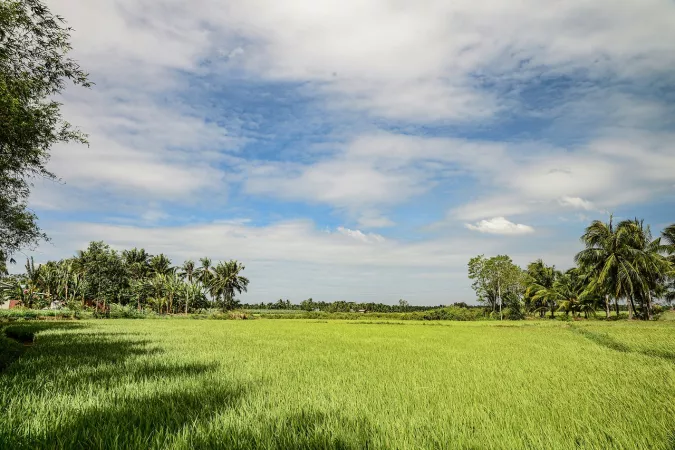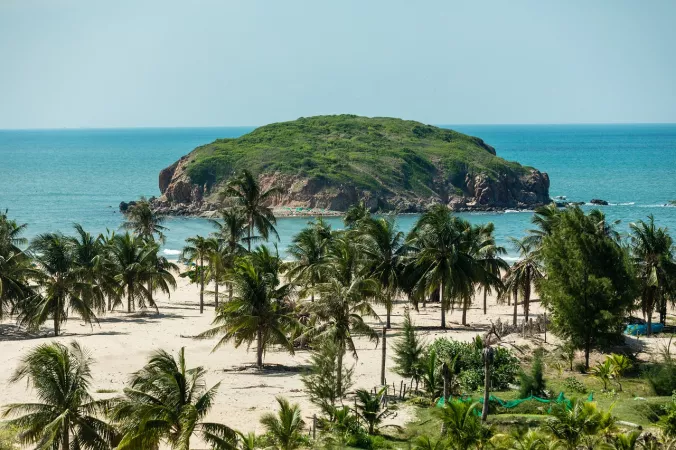
Quy Nhon Travel Guide
Quy Nhon, a coastal city in Vietnam, is renowned for its pristine beaches, rich history, and vibrant culture. Situated in the Binh Dinh Province, this hidden gem boasts a perfect blend of tradition and modernity. Quy Nhon is famous for its centuries-old relics, delicious seafood, and warm hospitality that attracts travelers from all over the world.Top Attractions in Quy Nhon
- Ky Co Beach
- Cham Towers
- Long Khanh Pagoda
- Hon Kho Island
- Eo Gio Cliff
Quy Nhon is Famous for
Breathtaking beaches and ancient relics.Top Attractions in Quy Nhon
- Explore the stunning Ky Co Beach
- Visit the historic Cham Towers
- Experience tranquility at Long Khanh Pagoda
- Island hop to Hon Kho Island
- Marvel at the panoramic views from Eo Gio Cliff
What's Great about Travelling to Quy Nhon?
- Perfect destination for beach lovers
- Rich historical sites for culture enthusiasts
- Authentic Vietnamese cuisine
- Less crowded than other tourist hotspots
What's Not So Great about Travelling to Quy Nhon?
- Limited nightlife options
- Language barrier for non-Vietnamese speakers
- Less developed tourist infrastructure
- Hot and humid climate during summer
Travel Tips for Quy Nhon
- Check visa requirements before traveling
- Use local transportation for an authentic experience
- Stay hydrated and wear sunscreen due to the sunny weather
- Respect the local customs and traditions
Important Quy Nhon trip information
- Ideal Duration: A week to explore the city and its surroundings
- Best Time to Visit: February to August for pleasant weather
- Nearby Airports and Railway Stations: Phu Cat Airport and Dieu Tri Railway Station
FAQ's on Quy Nhon
Q1: What is the best time to visit Quy Nhon?
The best time to visit Quy Nhon is from February to August when the weather is warm and dry, perfect for exploring the beaches and outdoor activities. Avoid the rainy season from September to January. The peak tourist season is from June to August when the city is bustling with visitors and activities.
Q2: Do I need a visa to travel to Quy Nhon?
Tourists traveling to Quy Nhon may require a visa depending on their nationality. Many nationalities can obtain a visa on arrival, while some countries are exempt from visa requirements for a certain period. It is advisable to check the specific visa requirements based on your nationality before traveling to Quy Nhon.
Q3: What are the must-visit attractions in Quy Nhon?
Quy Nhon boasts stunning attractions such as Ky Co Beach, Bai Xep Beach, Thap Doi Towers, and the Quang Trung Museum. Don't miss a visit to the Long Khanh Pagoda, Banh It Towers, and the bustling night market for a taste of local culture and cuisine.
Q4: Is Quy Nhon a safe place to travel?
Quy Nhon is generally a safe destination for travelers. Exercise normal precautions, avoid isolated areas at night, and be cautious of pickpockets in crowded places. It is advisable to follow basic safety measures and stay informed about your surroundings during your visit.
Q5: What is the local currency in Quy Nhon and can I use credit cards?
The local currency in Quy Nhon is the Vietnamese Dong (VND). While credit cards are accepted in hotels and some restaurants, it is recommended to carry cash for smaller establishments and local markets. ATMs are widely available in the city for convenient currency exchange.
Q6: What is the local cuisine like in Quy Nhon?
Quy Nhon is famous for its fresh seafood dishes, such as Banh Xeo (sizzling pancake), Banh It La Gai (sticky rice cake), and Bun Cha Ca (fish cake noodle soup). Explore the local markets and street food stalls to savor the authentic flavors of Vietnamese cuisine, rich in herbs and spices.
Q7: What transportation options are available in Quy Nhon?
Travelers in Quy Nhon can explore the city using various transportation options, including taxis, motorbike rentals, and local buses. Renting a motorbike is a popular choice for exploring the scenic coastal roads, while taxis are convenient for short distances. Public buses also provide affordable transportation within the city.
Q8: Are there any cultural norms or etiquette I should be aware of when visiting Quy Nhon?
When visiting Quy Nhon, it is important to respect local customs such as removing shoes before entering someone's home, dressing modestly when visiting temples or pagodas, and greeting others with a bow or a smile. Avoid public displays of affection and be mindful of local traditions to show cultural sensitivity during your stay.
Q9: I am a travel agent. How can I buy travel leads of Quy Nhon?
Register yourself as a travel agent at agents.tripclap.com and then you can buy travel leads to Quy Nhon once your account is approved. For more details contact our support team at +91-8069186564 or support@tripclap.com






